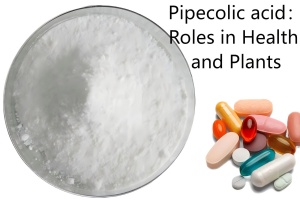Pipecolic acid:Roles in Health and Plants

Pipecolic acid is a non-proteinogenic amino acid derived from lysine metabolism. It plays a role in both plant and human physiology and has attracted interest due to its function in disease resistance and neurological disorders. This compound is naturally present in various organisms and has both biological and diagnostic significance.
Biological Role of Pipecolic Acid
In Plants
Pipecolic acid functions as a critical signaling molecule in systemic acquired resistance (SAR). When plants experience pathogen attack, pipecolic acid accumulates and triggers defensive mechanisms throughout the plant, even in uninfected areas. It enhances immunity by inducing defense genes, making it an essential molecule in agricultural biotechnology and crop disease resistance research.
In Humans
In human metabolism, pipecolic acid is an intermediate in lysine degradation. It is primarily metabolized in the peroxisomes and found in bodily fluids like plasma and cerebrospinal fluid. Abnormal levels of pipecolic acid are linked to peroxisomal disorders such as Zellweger syndrome and Refsum disease, making it a useful diagnostic marker.
Clinical Significance and Diagnostic Use
Metabolic Disorders
Elevated levels of pipecolic acid in the blood or urine can indicate defects in peroxisomal function. These disorders are rare but can be life-threatening, especially in infants. Detecting pipecolic acid concentrations using gas chromatography or mass spectrometry is a standard practice in clinical biochemistry labs.
Neurological Implications
Research has shown that pipecolic acid may accumulate in certain neurological conditions, such as pyridoxine-dependent epilepsy. Although the exact mechanisms remain under investigation, monitoring its levels can provide insight into neurological function and disease progression.
Production and Industrial Applications
Synthetic Methods
Pipecolic acid can be synthesized via chemical or enzymatic methods. Chemical synthesis involves hydrogenation of pyridine derivatives, while biotechnological production uses microbial fermentation. Advances in fermentation technology have enabled more sustainable and cost-effective production processes.
Pharmaceutical and Research Uses
Pharmaceutical companies use pipecolic acid derivatives in drug development due to their bioactivity and ability to cross the blood-brain barrier. It also serves as a valuable intermediate in organic synthesis and biochemical research, particularly in the study of amino acid metabolism and signaling pathways.
Future Perspectives and Research Trends
Therapeutic Potential
Scientists are exploring the potential of pipecolic acid analogs as modulators of immune response and neurological activity. Understanding its pathways may lead to new treatments for immune-related disorders and neurodegenerative diseases.
Crop Improvement
In agriculture, genetic engineering of plants to increase pipecolic acid production is being studied to improve crop resistance to pathogens. This research could reduce dependency on chemical pesticides and contribute to sustainable farming practices.
